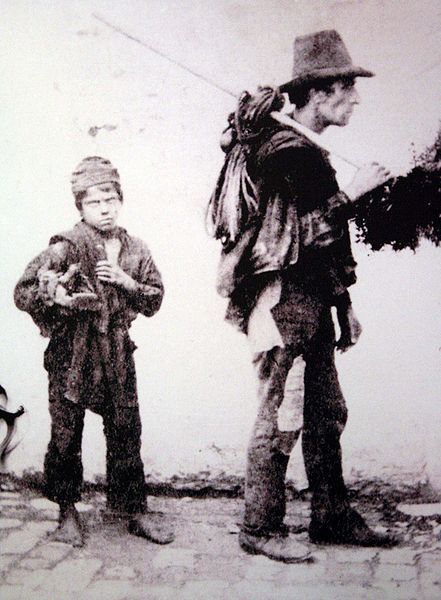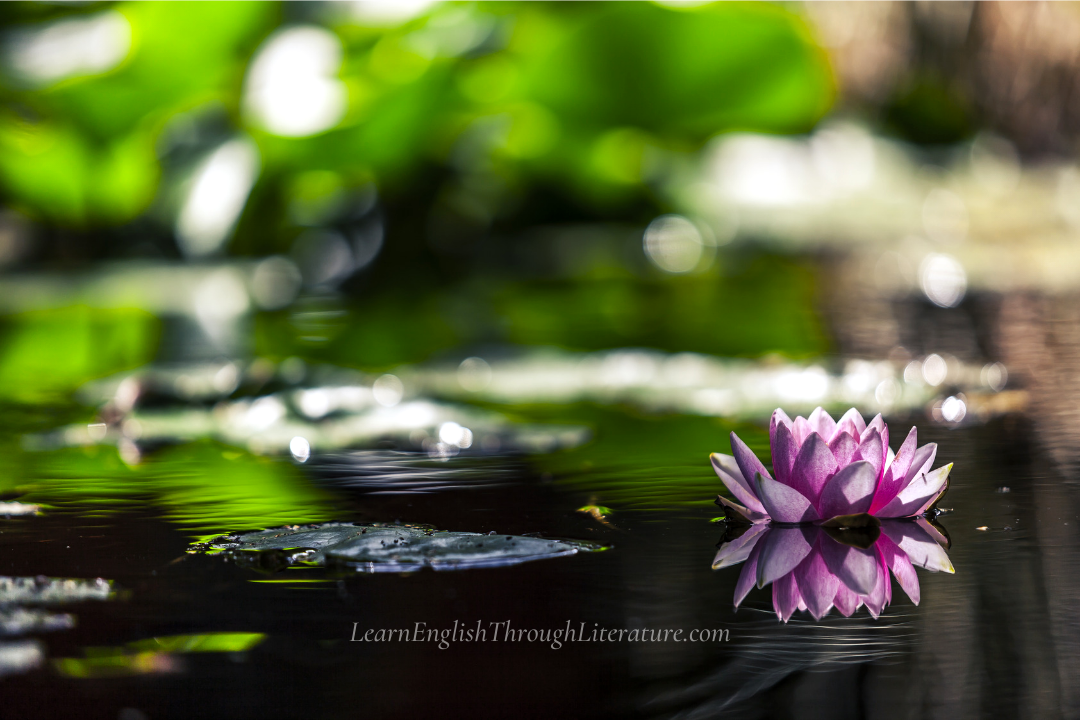I recently rediscovered a book on our shelves that my mother bought when we were children, and which I had been intending to read many times – only beginning now at last! 🗝️
📗 This book, Charles Kingsley’s The Water Babies (1863), is about a chimney-sweep, that is, a little child who used to sweep and clean out the soot from chimneys in the past – thankfully times have changed, and children are not forced to clean out chimneys like that!
It has been said that Kingsley wanted to highlight the cruelties of this practice in his time.
Since May 21st will also be the anniversary of a British reformer’s birthday – Elizabeth Fry (1780-1845), who helped to change the cruel conditions of prisoners in British prisons in the early 1800s – I thought it would be fitting (suitable) to prepare today’s Lesson on a novel that was written with the aim of reforming society (changing society for the better). 🕰️
I was impressed by one scene in particular, early in the first chapter.
Little Tom the chimney-sweep, the main character, is busy working away inside the chimneys of a grand mansion.
He suddenly comes into contact with the little rich daughter of this family – and he is surprised and shocked by the contrast between her life and his! ✨

(that is, the late 1800s) of two chimney-sweeps
(Credit: Wikipedia Commons)
Kingsley wrote this book for children, so most of the vocabulary is easy to understand. What is remarkable about this passage is how Kingsley uses adjectives – some simple ones, others more advanced – to help us to visualise and understand what Tom experienced in that memorable moment.
👉 Pay attention to the words in bold below – I have highlighted adjectives that feature strongly in this passage. You will also find a vocabulary list below, where some of these adjectives are defined.
Happy reading! 📚
…
📝 # PASSAGE FROM CHARLES KINGSLEY’S THE WATER BABIES (1863)
📗 How many chimneys Tom swept I cannot say; but he swept so many that he got quite tired, and puzzled too, for they were not like the town flues to which he was accustomed, but such as you would find— if you would only get up them and look, which perhaps you would not like to do— in old country-houses, large and crooked chimneys, which had been altered again and again, till they ran one into another, anastomosing (as Professor Owen would say) considerably. So Tom fairly lost his way in them; not that he cared much for that, though he was in pitchy darkness, for he was as much at home in a chimney as a mole is underground; but at last, coming down as he thought the right chimney, he came down the wrong one, and found himself standing on the hearthrug in a room the like of which he had never seen before.
Tom had never seen the like. He had never been in gentlefolks’ rooms but when the carpets were all up, and the curtains down, and the furniture huddled together under a cloth, and the pictures covered with aprons and dusters; and he had often enough wondered what the rooms were like when they were all ready for the quality to sit in. And now he saw, and he thought the sight very pretty.
The room was all dressed in white,— white window-curtains, white bed-curtains, white furniture, and white walls, with just a few lines of pink here and there. The carpet was all over gay little flowers; and the walls were hung with pictures in gilt frames, which amused Tom very much. There were pictures of ladies and gentlemen, and pictures of horses and dogs. The horses he liked; but the dogs he did not care for much, for there were no bull-dogs among them, not even a terrier. But the two pictures which took his fancy most were, one a man in long garments, with little children and their mothers round him, who was laying his hand upon the children’s heads. That was a very pretty picture, Tom thought, to hang in a lady’s room. For he could see that it was a lady’s room by the dresses which lay about.
The other picture was that of a man nailed to a cross, which surprised Tom much. He fancied that he had seen something like it in a shop-window. But why was it there? “Poor man,” thought Tom, “and he looks so kind and quiet. But why should the lady have such a sad picture as that in her room? Perhaps it was some kinsman of hers, who had been murdered by the savages in foreign parts, and she kept it there for a remembrance.” And Tom felt sad, and awed, and turned to look at something else.
The next thing he saw, and that too puzzled him, was a washing-stand, with ewers and basins, and soap and brushes, and towels, and a large bath full of clean water— what a heap of things all for washing! “She must be a very dirty lady,” thought Tom, “by my master’s rule, to want as much scrubbing as all that. But she must be very cunning to put the dirt out of the way so well afterwards, for I don’t see a speck about the room, not even on the very towels.”
And then, looking toward the bed, he saw that dirty lady, and held his breath with astonishment.
Under the snow-white coverlet, upon the snow-white pillow, lay the most beautiful little girl that Tom had ever seen. Her cheeks were almost as white as the pillow, and her hair was like threads of gold spread all about over the bed. She might have been as old as Tom, or maybe a year or two older; but Tom did not think of that. He thought only of her delicate skin and golden hair, and wondered whether she was a real live person, or one of the wax dolls he had seen in the shops. But when he saw her breathe, he made up his mind that she was alive, and stood staring at her, as if she had been an angel out of heaven.
No. She cannot be dirty. She never could have been dirty, thought Tom to himself. And then he thought, “And are all people like that when they are washed?” And he looked at his own wrist, and tried to rub the soot off, and wondered whether it ever would come off. “Certainly I should look much prettier then, if I grew at all like her.”
And looking round, he suddenly saw, standing close to him, a little ugly, black, ragged figure, with bleared eyes and grinning white teeth. He turned on it angrily. What did such a little black ape want in that sweet young lady’s room? And behold, it was himself, reflected in a great mirror, the like of which Tom had never seen before.
And Tom, for the first time in his life, found out that he was dirty; and burst into tears with shame and anger; and turned to sneak up the chimney again and hide; and upset the fender and threw the fire-irons down, with a noise as of ten thousand tin kettles tied to ten thousand mad dogs’ tails.
– Charles Kingsley, The Water-Babies: A Fairy Tale for a Land-Baby
…
📝 # VOCABULARY LIST
puzzled: unable to understand; confused; perplexed
accustomed: used to (doing something, being somewhere, knowing someone, etc)
altered: changed; transformed
pitchy: like pitch (tar); very dark with no light in it
huddled: crowded closely together (as for warmth)
gay: [dated] light-hearted, happy, and carefree
gilt: covered thinly in gold paint or leaf
foreign: describing something from another country or a distant land
awed: having awe – a feeling of respect, fear, and wonder
cunning: intelligent, clever, and crafty (often in a deceitful way)
snow-white: extremely white, like snow
delicate: very fine in texture or structure; fragile and easily disturbed or broken
live: being alive
ragged: in rags (old and torn pieces of clothing); having a rough and uneven surface or edge
bleared: blurred; dim
grinning: smiling broadly (usually in satisfaction), often showing one’s teeth
reflected: throwing back (an image, light, etc.) without absorbing it
…
I hope you were able to see for yourself the value of good, suitable, and timely adjectives in this small excerpt (short passage that is taken out of a longer work).
👉 Why not choose 3 adjectives from the list and use them for yourself today? (If you are ambitious, you can always choose more; but remember, you can make good progress even with just a very few, so don’t miss the opportunity!) 😉




